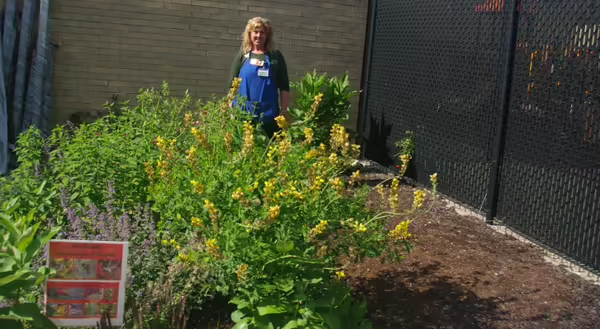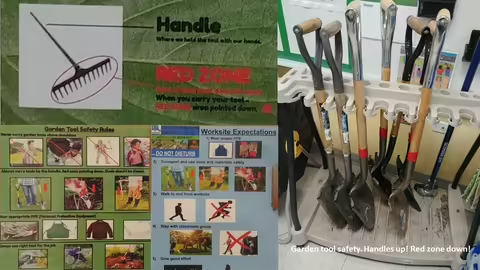
Kristen Dimas, a life-long gardener, used 2020 to invest in her education by completing two University of Illinois Extension training programs in Cook County— the Master Gardener program and the Master Urban Farmer Training Program (MUFTP). Over the past two years, she’s put her new knowledge to work.
Kristen moved from being a teacher’s aide to a full-time classroom teacher at Southside Occupational Academy High School, a Chicago Public School in West Englewood for 18 to 22-year-olds with intellectual disabilities which focuses on practical job training and education. Kristen is one of three teachers in the school’s urban agriculture and horticulture department.
She teaches about 150 students every year about garden tool safety, how to properly plant, mulch, water, harvest, propagate, collect data, and how to save seeds. Students complete the horticulture program understanding plants need soil, water, and sunlight to grow and thrive. Under supervision, they work in the gardens honing skills they could use in future employment and developing an appreciation for the natural world.
“Digging in the dirt is therapeutic. I want to bring that feeling to my students.”
- Kristen Dimas
Southside Occupational Academies gardens cover include vegetable gardens, native gardens, and a small fruit orchard. The students and teachers also raise bees, chickens, and ducks for honey and eggs. All food from the gardens is used onsite in the culinary program. Every year Kristen teaches four classes on native and perennial plants to about 50 students. The other two teachers focus on food and livestock production. In total, about 150 students a year participate in their classes. By the end of the year, students can demonstrate safe work practices, positive work behavior, and how to identify and properly handle tools.
In Kristen’s classroom, she has developed a seed-saving program and seed library. Students package and label native seeds for distribution at all-school markets and this year at the 1st Annual Chicago Ag Sciences Flower and Garden Show at the Chicago High School for Agricultural Sciences. They also developed herbal teas, scented oils, herbal sachets, and potted succulents to distribute for free at these markets. The students demonstrate pride and ownership in the presentation and quality control needed to produce these products. Their excitement at market is contagious.
“You can’t have food production without pollinators. You need nature. My role is to spread plants, knowledge and passion.”
- Kristen Dimas
During her time in the Master Urban Farmer program Kristen began developing a vision and a mission for revamping the school gardens to make them more accessible to students with disabilities. She began designing the garden’s mission by taking the school’s B.L.U.E. motto, “Southside Occupational Academy is a place where: We Believe in ourselves. We Learn in different ways. We Understand we are important. We Excel in school, work, and the community.” Her initial vision was very focused on garden design so the gardens would accessible for all students. She took the MUFTP training to heart and began laying out plans and budgets. During the summer of 2021, she spent about 12 hours a week during working diligently to replant and revive the gardens and create wide accessible walkways and paths. Each of the 12 native gardens is centered on a theme or a study focus. Plots are dedicated to pollinator plants, Monarch butterfly habitat, hummingbird habitat, and a sensory garden. One of Kristen’s challenges in the adaptive garden is how to involve all students. “I really have to think about every kid and what they can contribute. I’ve learned my students in wheelchairs can be data collectors.”
Over the past 18 months, Kristen’s new-found skills and confidence have led her to see that her mission extends beyond the school to outreach and activities in the surrounding neighborhoods. Her class grew and distributed 1,500 native plants with the food production class producing a similar amount of vegetable seedlings. The students produced a Public Service Announcement as a rap about monarchs for the school’s daily news. They’ve also begun participating in the Field Museum’s Monarch Butterfly Conservation Program as citizen scientists monitoring caterpillars and egg production in their gardens.
In the fall they plan to staff a monarch educational table at a local farmers’ market and partner with local community gardens where the students can plant milkweed close to their homes. Finally, Kristen has worked on a design and planning team to transform an empty lot across from the school to a community garden where graduates can continue honing their gardening skills and for the community to come work with and learn from the graduates. She sees this garden as one way to start spreading the school’s seeds and plants throughout the community.
Kristen explains her expanded vision, “I want to spread the knowledge of and passion for plants and nature throughout the community. While I focus on natives and pollinators, they are an important part of the food systems. Without them we would not have food to eat. The more people who appreciate this means more pollinators and more food produced in urban areas.”
"My dream for the gardens grew due to my Extension training. I began to see all the possibilities."
- Kristen Dimas
Kristen’s take-home message from her MUFTP training was to “start small and plan! Do it right the first time. And to envision things as an interconnected system.” Kristen plans to work on creating a pipeline for her students to be involved in urban agriculture after they graduate.
Nancy Kreith, Horticulture Educator, and one of Kristen’s instructors and mentors in the Cook County Master Gardener program confirms that “Master Gardener training built Kristen’s confidence to teach others about growing. With her go-getter attitude, she has built an incredible outdoor learning space for students and has also motivated and inspired her fellow teachers.” Kristen sums up her new experience and expanded vision, “At Southside Occupational Academy we are able to help address blight, free seed and plant distribution, and outreach to increase involvement and interest in urban agriculture. These are difficult concepts to measure. But I’m determined to leave a positive footprint with these kids and the surrounding southside communities.”
Favorite thing to grow: “All milkweeds. They are a pollinator host plant and support conservation efforts. It’s also very difficult to teach about pollination using bees because so many of my students are afraid of them. Instead I focus on the friendly monarch butterfly.” In addition to the Field Museum’s monarch program, Illinois Extension has a community science research project devoted to all pollinators, called I-Pollinate.
Shhh… it’s (was) a secret: Kristen’s education continues. She completed Cook County’s Compost Ambassador pilot training program during Winter 2022. Look for a refined version of the course to be offered in 2023.
Learn more about seed saving at Seed Savers Exchange. Look for announcements in our March 2023 newsletter about area seed swaps.
Celebrate pollinators June 20-26, 2022 for National Pollinator Week. Pollinators’ play a “foundational role in supporting American food and agriculture, forest and grasslands, and other ecosystems….”
All photos by Kathryn M. Pereira
MEET THE AUTHOR
Kathryn Pereira is a local food systems and small farm educator with University of Illinois Extension serving Cook County. Raised on the southside of Chicago, her career in agriculture began in 1990 in Mozambique. Later she owned and operated an organic vegetable farm in New Hampshire before returning to the Midwest to earn her Master of Science in Agricultural and Applied Economics from University of Wisconsin–Madison. She regularly volunteers with USAID’s Farmer-to-Farmer Program in southern Africa and is passionate about improving small farmers’ income and quality of life as well as consumers’ access to local foods. She provides workshops, technical assistance consultations, site visits, and referrals to resources for urban and peri-urban food system projects, organizations, commercial farmers, and residents interested in urban agriculture and local food systems.

